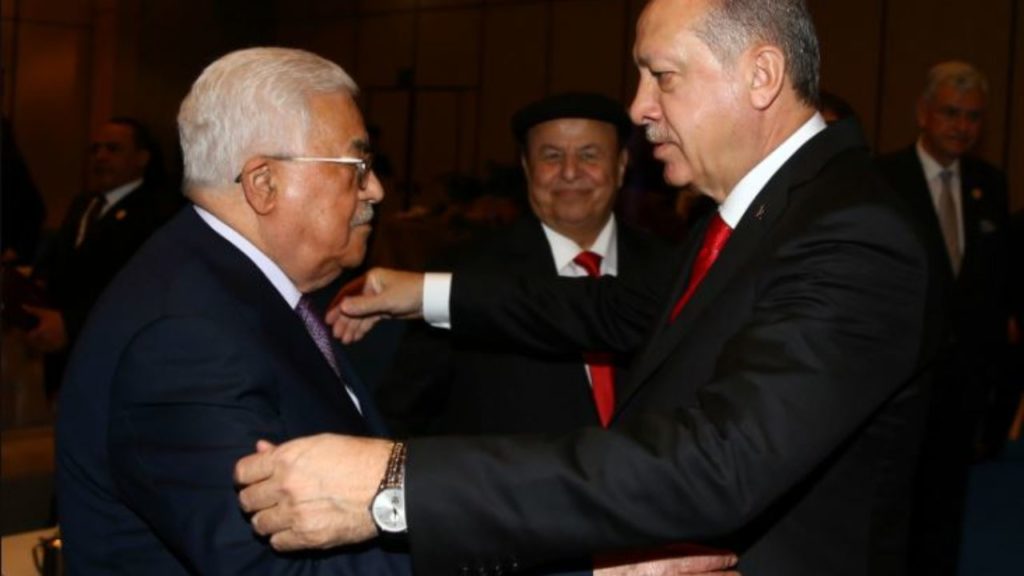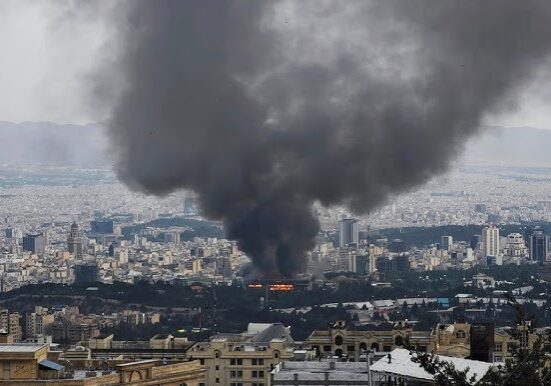Australia/Israel Review
The Palestinian split with the Arabs
Nov 4, 2020 | Khaled Abu Toameh

Shortly after Mahmoud Abbas was elected president of the Palestinian Authority in January 2005, Egypt’s then-President Hosni Mubarak was asked what advice he would give Palestinian leaders.
Mubarak, in an interview with the Al-Arabiya television network, replied:
“There has to be a new thinking about the Palestinian issue. Otherwise, we [Arabs] will continue to say no. We have been saying no for the past 50 years, and that is why we missed many opportunities. We said no to the [UN’s 1947] Partition Plan, and in 1967 we said no to recognising Israel in return for a withdrawal [to the 1949 armistice lines]. At the time, we said that what was taken by force can only be restored by force.
“They have rejected everything. Now we are in a swamp. The Palestinian people are suffering due to the economic crisis. In my view, the Palestinian leadership now needs to give peace a chance. They need to sit at the negotiating table. This will send a message to the people that there is hope for peace.”
Fifteen years later, it is evident that Abbas and the Palestinian leadership never took Mubarak’s advice seriously. On the contrary, the Palestinian leaders are continuing to act not only against the advice of Mubarak and other Arabs, but also against the interests of their own people.
For the past three years, Abbas has cut off all ties with the US Administration to protest President Donald Trump’s recognition of Jerusalem as the capital of Israel. Since the beginning of this year, Abbas has rejected Trump’s vision for peace in the Middle East, known as “Peace to Prosperity,” and suspended all ties with Israel, including security coordination.
What Abbas has done is to reject peace with Israel and prosperity for Palestinians to appease Hamas, Turkey and Qatar.
Abbas and the Palestinian leadership have, in the past few weeks, strongly come out against the peace deals signed between Israel, the United Arab Emirates (UAE) and Bahrain. This position has placed the Palestinians on a collision course with several Arab countries, especially the Gulf states. Many Arabs are reportedly furious with the Palestinian leadership for accusing the UAE and Bahrain of “betraying the Palestinian issue, the Al-Aqsa Mosque and Jerusalem.”
Instead of talking to the Americans, the Israelis and Arabs who support the idea of making peace with Israel, Abbas is now talking to Hamas, Turkey and Qatar. In early October, he sent a senior delegation of his ruling Fatah faction to Istanbul to discuss with Hamas leaders the possibility of holding long-overdue elections for the PA presidency and Palestinian parliament, the Palestine Legislative Council.
The two parties said they have agreed to hold new elections within six months. Previous agreements between Fatah and Hamas, however, were never implemented as the two sides continue to engage in a struggle over money and power.
The latest Fatah-Hamas discussions were held under the auspices of Turkish President Recep Tayyip Erdogan, who is also opposed to the peace accords between Israel and the two Gulf states. After the meeting, the Fatah delegation, headed by Jibril Rajoub, flew to Qatar in a bid to win its backing for any agreement reached with Hamas. The Qataris have long been leading supporters of Hamas, an offshoot of the Muslim Brotherhood organisation.
Erdogan has also fully embraced Hamas, whose charter openly calls for the annihilation of Israel. In September, Erdogan met with a large delegation from Hamas, including Ismail Haniyeh and Saleh Arouri, both of whom have been designated by the US State Department as Specially Designated Global Terrorists because of their involvement in terrorist attacks against citizens of Israel and the US.
In mid-October, Abbas talked on the telephone with Erdogan and Haniyeh about the prospects of achieving Palestinian “national unity” and foiling US and Israeli “conspiracies” against the Palestinians.
Mubarak advised Abbas and the Palestinian leadership to give peace a chance, to stop saying no to all peace plans and initiatives and to return to the negotiating table with Israel. By associating himself with Erdogan and Hamas, however, Abbas is demonstrating that he would rather give Muslim extremists a chance, evidently to advance their anti-Israel and anti-Western goals and ambitions.
Pointedly, a report in a Palestinian media outlet belonging to Abbas’ arch-rival, Mohammed Dahlan, alleged that the Fatah delegation in Istanbul in early October met with officials from Iran’s Islamic Revolutionary Guard Corps (IRGC), as well as Turkish and Qatari intelligence officers.
According to the report, sources in Abbas’ office revealed that, during his call with Erdogan, the Palestinian leader bad-mouthed Egyptian President Abdel Fattah Al-Sisi and Saudi King Salman bin Abdulaziz. The report added that “analysts specializing in the Palestinian issue commented that Qatar and Turkey will use Abbas to harm the interests of Saudi Arabia, Egypt, the UAE, Bahrain, Jordan, Kuwait, Oman, Sudan, Mauritania, Morocco and Tunisia.”
The report also alleged that Qatar recently gave Abbas and some of his aides “more than $50 million for their personal bank accounts inside banks in Israel and the Palestinian Authority areas.”
Some Arabs are now trying to advise the Palestinian leadership in the same way that, already 15 years ago, Mubarak did. The voices of these Arabs, nonetheless, do not seem to be making any more of an impression on Abbas or anyone in the top echelon of the Palestinian leadership than Mubarak’s did.
Palestinian leaders continue to say no to the constructive voices in the Arab world, while saying yes to terrorist-promoting Turkey, Qatar and Hamas. That stance may explain why so many Arabs are frustrated with the Palestinian leadership.
“The Palestinian leadership has lost its symbolism, even among the Palestinians,” remarked Abdullah Al-Ghathami, a respected professor of criticism and theory at King Saud University.
“The Palestinian leadership has lost its credibility in the eyes of the new Arab generation, which is a generation of technology. Once, for us the homeland was the whole Arab world. We were all an army of freedom fighters for the Palestinians. We used to accept their mistakes, even their insults because the Palestinian issue was Number 1 for us. Today the new generation thinks differently. The Palestinian leadership is irrelevant. Palestinians needs [sic] a young leadership that would be able to address the young Arab generation.”
Echoing the same sense of disillusionment with the Palestinian leadership in the Arab world, a Syrian journalist based in the UAE, who calls herself Shukran, posted the following advice to the Palestinians:
“This is a message directed to the Palestinians who are focusing their efforts on offending the UAE. I just want to say a few words, my dear Palestinians: Your real enemy is in front of you; it is the corrupt Palestinian Authority. Open the files of the corrupt Palestinian Authority. Check where did the sons of the leaders of the Palestinian Authority study? What kind of life are they living? How did they get their education? They live in peace, stability, prosperity and luxury. Take a look at your own children. Your children who are instilled with hatred. What has the Palestinian Authority given you? We are no longer the generation of revolution and rage; we are a generation that aspires to achieve peace and love. We want to live and raise our children in peace and security. We tried wars, now we want to try peace.”
Abdullah Al-Hakeem, a Saudi political analyst and former director of the Middle East Centre for Strategic and Legal Studies, concurred:
“The real enemy of the Palestinians is the corrupt Palestinian Authority. When I visited Israel, I attended an event for a member of the Palestinian Authority, and I saw people queuing up to enter to eat. How much I suffered watching this scene. One of the members of the Palestinian Authority asked me why I left the event. I answered him that we must make peace with Israel to create a better reality for the Palestinians. He got angry with me and stopped talking to me.”
Al-Hakeem was apparently referring to poor people who had come to the event to beg for food.
Dr. Khaled Al-Qasimi wrote in a Yemeni website that the uproar Abbas and the PLO caused over the UAE normalisation accord with Israel is unacceptable. Palestinian leaders, Al-Qasimi said, “do not want to solve the Palestinian issue because resolving the issue means losing their personal benefits.”
“There is no doubt that the wealth that the Palestinian leaders have accumulated during more than half a century is more important [to them] than the Palestinian people and their issue. Wars that have brought us nothing but destruction…”
Noura Al-Moteari, an Emirati author and political researcher, advised the Palestinians:
“The only solution available to the Palestinian people is to move immediately to remove the dilapidated Palestinian leaders. Palestinians need to nominate a transitional council, as in Sudan, and to work hard to find a Palestinian leadership that can take advantage of peace processes.”
As in the past, the Palestinian leadership are continuing to ignore the advice of their Arab brothers to try peace and replace their corrupt and incompetent leaders. This refusal seems to be the main reason many Arabs today feel that the Palestinian issue is no longer central to all Arabs and Muslims.
Khaled Abu Toameh, an award-winning Palestinian Affairs journalist based in Jerusalem, is a Shillman Journalism Fellow at the Gatestone Institute. Reprinted from the Gatestone Institute (www.gatestoneinstitute.org). © Khaled Abu Toameh, reprinted by permission, all rights reserved.
Tags: Hamas, Middle East, Palestinian Authority, Palestinians, Turkey






